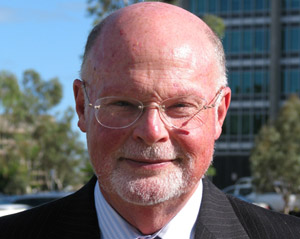Army must become Facebook savvy: Farr

Facebook "isn't going to go away" and the Defence Force must learn how to deal with it, according to Department of Defence chief information officer Greg Farr.

Greg Farr(Credit: Ben Grubb/ZDNet Australia)
"This isn't going to go away ... [Social networks] have real opportunities for us in a large and distributed workforce, but it's going to require an organisational change and cultural change, and we also need to look at potential implications for them within the defence environment," Farr said at a Committee for Economic Development Australia CIO series lunch in Sydney yesterday.
Farr highlighted the recent case of an Israeli solider revealing details of a planned raid through a Facebook status update as an example of why the use of social media had raised privacy concerns in the Defence Department, but he said that Chief of Army Ken Gillespie "is an activist" for social media and had been pushing for greater uptake of social-networking tools to communicate with soldiers who are used to using them in their daily lives.
"He wants to [communicate] in a way that his troops can identify, in a way they actually prefer," he said. "He doesn't want to go through intermediaries, he wants to talk to his soldiers directly."
"He has a Facebook site, he has Twitter and he has put in place structures within the army that are able to manage this sort of capability."
Farr said Defence needed to take a different approach to explaining the implications of revealing information on Facebook, telling the troops how it could affect their mates in the army.
"We need to be much better at explaining the implications of it," he said. "Just saying 'you can't do that because it's against the rules' is probably not going to wash".
Farr said Defence needed to learn to take risk judgements on social networking and not be afraid to be open to criticism if something goes wrong.
"If something goes wrong it's going to take a lot of courage from senior manager such as me and others to say 'well shit happens, quite frankly, let's get over it and move on'."
"I don't think there's any way we're going to give 80,000 soldiers access to Facebook where we can actually check every line they put in there."
While the public face of defence is moving to social media, internally, the department has not moved to social networking, instead opting for more traditional methods of communication such as email.
Defence's app development
Farr said the United States Army mobile device application competition "Apps for Army" was a reminder that the software development process within the Australian army needs to become cheaper and shorter than the three-year turn around time currently in place.
"What the US Army is doing has given us a wake-up call that a lot of these things can be done more quickly and cheaply," he said.
While nothing is planned in the immediate future, Farr used BulletFlight, a military ballistics calculator app that sells in the iTunes store for $36.99, as an example of the type of app that would be suitable for the Defence Force. Defence's chief technology officer Matt Yannopoilos had previously revealed that enemies in Afghanistan were also using iPhone apps to fight Australian forces.
In an interview with ZDNet Australia after the conference, Farr noted that BlackBerry devices were currently approved for use at a restricted level within Defence but iPhones were not allowed. According to Farr, Apple would have to apply with Defence Signals Directorate to get security accreditation before Defence employees could use the iPhone within the department.
Farr also revealed that as part of the $1.2 billion to be spent over the next decade to revamp IT systems, Defence is currently in negotiations with potential suppliers for a new purpose-built tier 3 datacentre to replace the datacentres in Melbourne and Canberra, but said that no deal had yet been agreed upon.